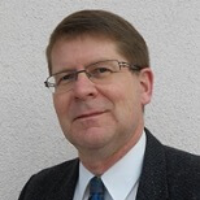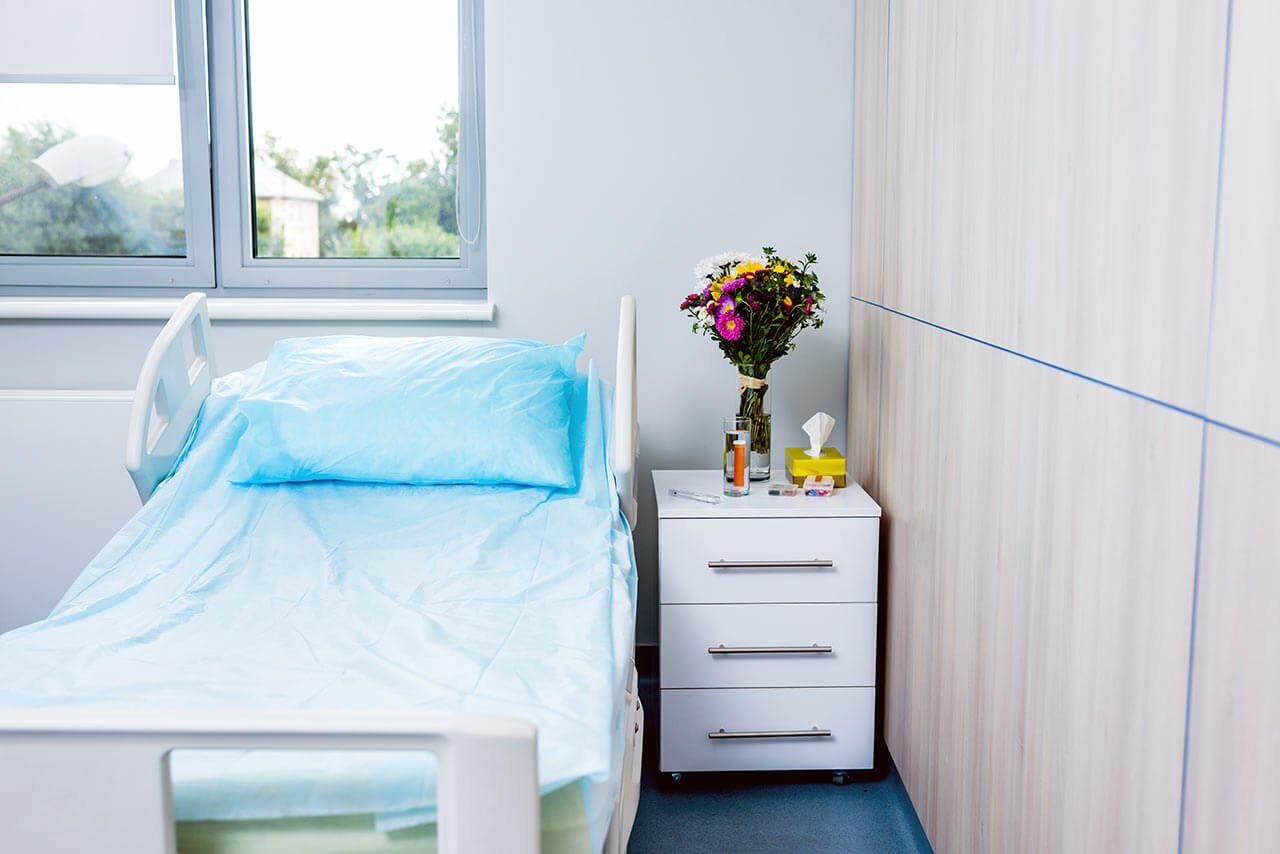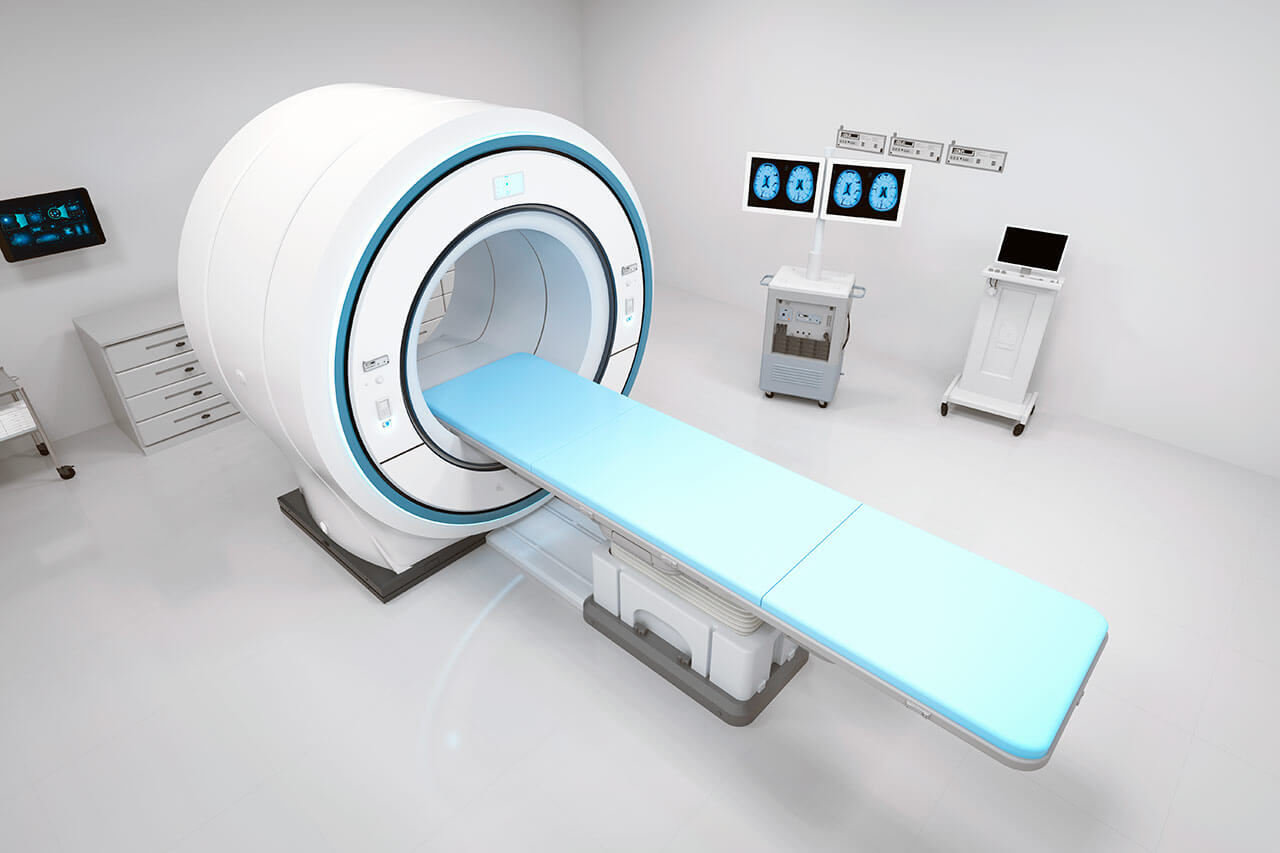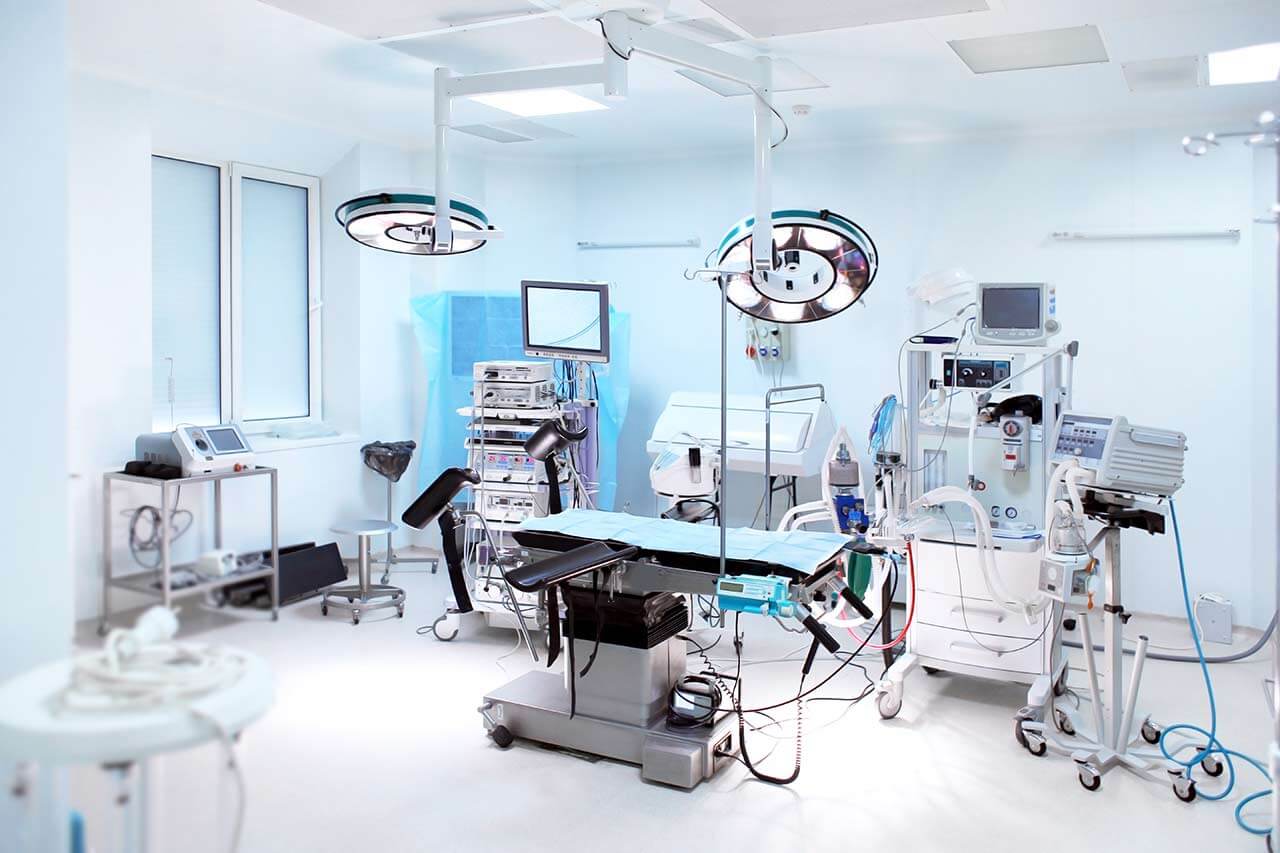
The program includes:
- Initial presentation in the clinic
- clinical history taking
- review of medical records
- physical examination
- laboratory tests:
- complete blood count
- general urine analysis
- biochemical blood test
- inflammation markers (CRP, ESR)
- blood coagulation analysis (aPTT, PT, INR)
- neurological examination
- electrophysiology study (if indicated clinically)
- CT/MRI scan
(if indicated clinically, additional cost is 650/1200€) - lumbar puncture with CSF analysis
(if indicated clinically, additional cost is 1500 €) - nursing services
- consultation of related specialists, including specialists in
oncology and radiotherapy - treatment by chief physician and all leading experts
- explanation of individual treatment plan
Required documents
- Medical records
- MRI/CT scan (not older than 3 months)
- Biopsy results (if available)
Service
You may also book:
 BookingHealth Price from:
BookingHealth Price from:
About the department
The Department of Adult and Pediatric Neurosurgery at the University Hospital Giessen UKGM offers the full range of surgical interventions for the treatment of diseases of the nervous system. The department annually performs about 2,000 operations, which testifies to the rich clinical experience and skills of neurosurgeons. The specialists of the department practice modern medicine, which takes care of the individual needs of patients and meets international recommendations based on evidence-based medicine. The department specializes in the treatment of brain, pituitary tumors, as well as spinal and vascular neurosurgery. Another priority focus is the surgical treatment of neurosurgical diseases in children. The department is headed by Prof. Dr. med. Eberhard Uhl.
The department’s specialists mostly provide medical care to patients with meningioma, glioblastoma and metastases of lung or breast cancers. In most cases, a neurosurgical procedure is performed to relieve symptoms, such as headache, epileptic seizures or paresis. The expediency of the operation is determined individually for each patient. To provide the surgical treatment of brain tumors, the department uses fluorescence labeling (5-Ala) in combination with neuronavigation. The department is one of the European centers for training specialists in the use of fluorescence control in resection. There is also the opportunity to participate in national and international clinical trials of new drugs and treatment methods.
Another equally important field of clinical practice is the treatment of spinal pathologies. The department’s neurosurgeons annually perform more than 600 spinal interventions using all modern surgical techniques, which range from endoscopic interventions to complex reconstructive operations. At the same time much attention is paid to an individual approach to each clinical case. Whenever possible, operations are performed using sparing minimally invasive techniques and with the best possible preservation of functionality. The surgeons of this area have extensive experience in the treatment of all spinal diseases and injuries, including especially complex clinical cases. Their work is certified by the German Spine Society (DWG), the German Society of Neurosurgery (DGNC). In addition, the department is registered as the Center for the Second Opinion of the German Spine Society (DWG).
Pediatric neurosurgeons specialize in operations to treat diseases and injuries of the brain/spinal cord and peripheral nerves in children, pathologies of the skull and spina bifida, premature closure of the sutures of the skull (craniosynostosis), all forms of hydrocephalus, vascular malformations of the brain or spinal cord, as well as special interventions for drug-resistant epilepsy (vagus nerve stimulation).
The surgical techniques in the field of pediatric neurosurgery cover microsurgical interventions using navigation (neuronavigation, stereotaxia with or without a frame), intraoperative imaging (cutting-edge ultrasound techniques) and electrophysiological monitoring (neuromonitoring). Particular focus is placed on minimally invasive endoscopic surgical techniques using special pediatric endoscopic systems.
The department’s spectrum of surgical services includes:
- Surgical treatment of brain tumors
- Meningiomas
- Gliomas
- Lung and breast cancer metastases
- Fluorescence labeling of tumors (5-Ala) in combination with neuronavigation
- Clinical trials
- Spinal surgery
- Degenerative spinal diseases, such as a herniated disc, spinal stenosis, degenerative spondylolisthesis and scoliosis
- Tumors of the spine, spinal cord and its meninges
- Spinal injuries
- Infectious spinal diseases (for example, spondylitis)
- Spinal deformities
- Spinal malformations (spinal dysraphia)
- Minimally invasive decompression procedures for herniated discs and stenosis of all parts of the spinal canal
- Endoscopic surgery for the treatment of herniated intervertebral discs of the lumbar spine
- Microsurgical operations for tumors, vascular diseases and malformations of the spine, spinal cord and its meninges using multimodal electrophysiological monitoring (monitoring of the nerve endings and spinal cord)
- Functional dynamic stabilization in case of lumbar spine instability of a degenerative nature
- Stabilization and fusion operations for all parts of the spine through anterior, posterior or lateral access (whenever possible, minimally invasive techniques are used)
- Prosthetics of the intervertebral discs of the cervical spine in degenerative diseases
- Kyphoplasty and vertebroplasty for fractures due to osteoporosis or cancer (in collaboration with the Department of Trauma Surgery, Hand Surgery and Reconstructive Surgery)
- CT- and X-ray-guided infiltration and thermal ablation of facet and sacroiliac joints, periradicular therapy (in collaboration with the Department of Neuroradiology)
- Neuromodulation methods (for example, spinal cord or nerve ending stimulation, implantation of pumps with painkillers)
- Vascular surgery
- Cerebral aneurysms
- Clipping
- Occlusion with platinum coils (inserted through catheters)
- Arteriovenous malformations and dural fistulas
- Gamma Knife treatment
- Combination treatment using catheter embolization and subsequent surgical removal
- Cavernomas
- Surgical treatment using neuronavigation
- Cerebral aneurysms
- Pituitary tumor surgery
- Endoscopic interventions (minimally invasive) under the control of neuronavigation
- Surgery using a stereoscopic surgical microscope
- Pediatric neurosurgery
- Minimally invasive endoscopic neurosurgery
- Cancer surgery (brain and spinal cord tumors)
- Vascular microsurgery (vascular malformations of the brain)
- Hydrocephalus treatment (endoscopic techniques, bypass surgery)
- Craniospinal surgery (Chiari malformation)
- Imaging-guided planning and performance of surgical procedures (neuromonitoring)
- Intraoperative imaging (modern ultrasound system, ultrasound navigation)
- Endoscopic microsurgery
- Intraoperative neuromonitoring (evoked potentials, cranial nerve monitoring, motor cortex activities, EEG)
- Stereotactic surgery using a special frame, CT or MRI planning before biopsy (brain, cerebellum, brain stem)
- Pain therapy
- Peripheral nerve stimulation
- Lumbalgia (chronic back pain)
- Groin pain
- Scar pain
- Pain in the arms or legs
- Headache (migraine)
- Epidural spinal cord stimulation
- Chronic leg pain after surgery on the spine (failed back surgery syndrome)
- Direct or indirect damage to the nerve endings of the upper or lower extremities (complex regional pain syndrome of type I and II)
- Phantom pain
- Therapy for refractory arterial occlusion, peripheral arterial occlusive disease
- Drug-resistant angina pectoris
- Postherpetic neuralgia
- Motor cortex stimulation
- Facial pain
- Phantom pain
- Thalamic pain
- Thermocoagulation of the Gasserian ganglion
- Therapy using the implantation of drug pumps (intrathecal drug therapy)
- Diffuse pain
- Complex pain syndromes
- Pronounced spasticity
- Peripheral nerve stimulation
- Neurosurgical intensive care
- Other medical services
Curriculum vitae
Prof. Dr. med. Eberhard Uhl studied medicine at the Universities of Bochum, Heidelberg/Mannheim and Duke University in Durham, North Carolina, USA (1984 - 1990). Then he worked as a Research Fellow at the Institute of Experimental Surgery of Ludwig Maximilian University of Munich, after which in late 1992 he moved to the Department of Neurosurgery, where he underwent training for board certification. In 2000, he defended his thesis on Neurosurgery. From 2001 to 2003 he worked as a Senior Physician in the Department of Neurosurgery at the University Hospital Aachen, whereas from 2003 to 2007 he worked as a Senior Physician in the Department of Neurosurgery at the University Hospital of Ludwig Maximilian University of Munich (in 2005, took the position of a Leading Senior Physician). In 2007, he headed the Department of Neurosurgery at the Clinic Klagenfurt am Wörthersee in Austria. The doctor now leads the Department of Adult and Pediatric Neurosurgery at the University Hospital Giessen, as well as holds the position of W3 Professor for Neurosurgery at Justus Liebig University of Giessen.
The clinical interests of Prof. Uhl covers neurovascular surgery and tumor surgery, in particular, skull base and pituitary tumors. Such interests led to long-term cooperation with the Max Planck Institute of Psychiatry in Munich on an experimental basis and in the field of clinical research. The recent studies have focused on pituitary function in patients with traumatic brain injury and subarachnoid hemorrhage. In addition, Prof. Uhl studied the development of cerebral edema, as well as disorders of the cerebral microcirculation in various forms of stroke (both from a scientific and experimental point of view). His most recent research focuses on the intraoperative use of computed tomography and neuronavigation in the surgical treatment of pathologies of the spine and brain tumors.
Photo of the doctor: (c) UKGM - Universitätsklinikum Gießen und Marburg GmbH
About hospital
The University Hospital Giessen UKGM positions itself as an ultramodern medical facility with outstanding quality of medical care. The hospital presents almost all areas of medicine, ranging from ophthalmology to traumatology and dentistry. The priorities of the hospital’s activities include surgery, neurosurgery, oncology, nephrology with kidney transplantation and pediatric medicine.
The hospital is the third largest in Germany. Every year, more than 436,000 patients are treated in two locations of the hospital (Giessen and Marburg): 342,000 outpatients and 94,000 inpatients. The medical facility is the first privatized university hospital in the country.
The hospital staff is engaged not only in clinical practice, but also in research activities on the basis of the Faculty of Medicine at Justus Liebig University Giessen and Philipps University of Marburg, which contributes to a significant contribution to the development of modern medicine. During the many years of productive work on the development of new diagnostic and treatment methods, the hospital’s doctors managed to make many significant discoveries.
The hospital enjoys an excellent reputation in Germany and far beyond its borders. It managed to gain such credibility thanks to the high competence of doctors, advanced equipment, high-quality medical service and care.
Photo: (c) depositphotos
Accommodation in hospital
Patients rooms
The patients of the University Hospital Giessen UKGM live in comfortable rooms made in a modern design and light colors. Each room has an ensuite bathroom with shower and toilet. The standard room furnishing includes an automatically adjustable bed, a bedside table, a wardrobe, a table and chairs for receiving visitors, a TV, a telephone.
Meals and Menus
The patients of the hospital are offered balanced, healthy three meals a day: buffet breakfast, lunch and dinner. The private kitchen, certified according to DIN EN ISO 9001:2000, is responsible for providing patients with food and drinks.
If for some reason you do not eat all foods, you will be offered an individual menu. The hospital also has a cafeteria with a large assortment of hot and cold drinks, snacks and desserts.
Further details
Standard rooms include:
Television
All patient rooms are equipped with TV sets. If you have some questions, please contact medical personnel.
Religion
Religious services can be provided upon request.
Accompanying person
During an inpatient program, an accompanying person can stay with you in a patient room or in a hotel of your choice.
Hotel
During the outpatient program, you can stay at the hotel of your choice. Our managers will help you to choose the most suitable option.




